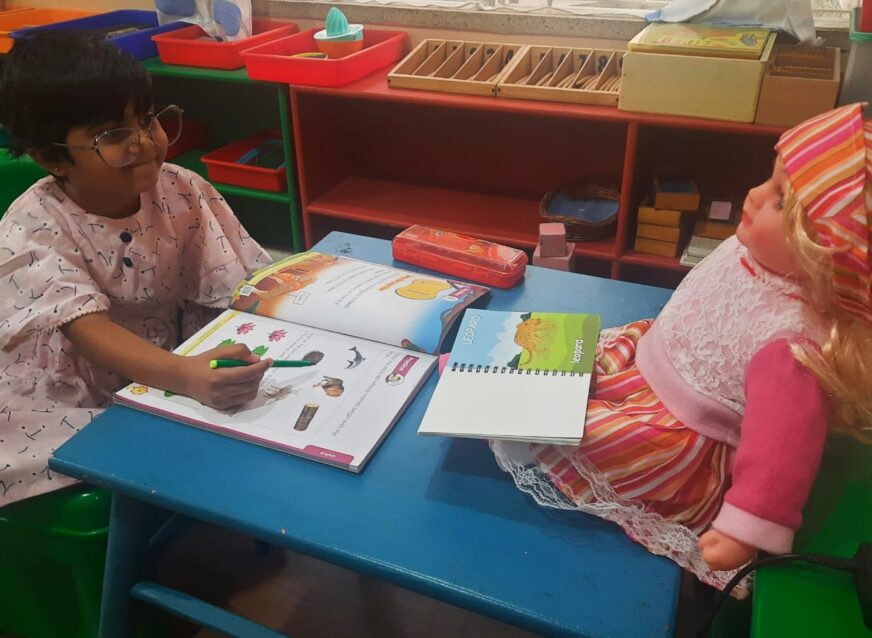
Let your Child Pretend Play!
Does your child dress up like a dentist, a shopkeeper, a teacher, a parent or a doctor? Does he/she try to relate objects with real life things? Then wait a moment, cause your child is developing and learning different and important life skills. Preschoolers engage in different types of play at different ages, one such play is “Pretend Play” (identified by Swiss Psychologist Jean Piaget, 1951).
Pretend play has many different names, such as:
- Make-Belief play
- Dramatic play
- Fantasy play
- Imaginative play
It, begins during infancy and declines as school-age children become more involved in formal play.
Play is the work of the young, it contributes to all round development of the child. Children make use of their senses, muscles, gain mastery over their bodies and acquire new skills through play. A number of theorists and researchers have identified the values of pretend or imaginative play as a vital contributor to the normal development of a child.
Let us explore why Imagination is so important in Child Development.
Imagination is an essential component of childhood, helping children learn many important lifelong skills. During imaginative play, children try to imitate or role play what they have observed in different situations. Such kind of play has no rules, simply picking up a broom and imagining it to be a magic wand or a cardboard box to be a ship. This play indirectly impacts their social, emotional, cognitive and language skills which are essential for human development. Allowing your child to pretend play will do the following:
1.Enhance creativity and imagination
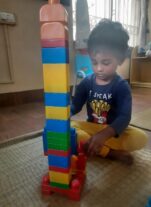 As Albert Einstein said, “Logic will get you from A to Z; imagination will get you everywhere”. Children need to be encouraged to use their cognitive skills as much as possible through pretend play so that they become more confident as adults. For e.g. When a child acts as a veterinarian doctor, examining his toy dog, he is showing an important cognitive development of early childhood i.e., the ability to use symbols to stand for people or things in the real world.
As Albert Einstein said, “Logic will get you from A to Z; imagination will get you everywhere”. Children need to be encouraged to use their cognitive skills as much as possible through pretend play so that they become more confident as adults. For e.g. When a child acts as a veterinarian doctor, examining his toy dog, he is showing an important cognitive development of early childhood i.e., the ability to use symbols to stand for people or things in the real world.
2. Enhance problem-solving skills
Early years exposes children to different environments which is important for their overall development. Deciding which game to play, what role to play, which materials to use etc. requires thinking and thereby coming to a solution. For e.g. a child wants to play “teacher teacher” he/she has to decide who will be the teacher, who will be the students, what materials will be required for teaching etc. Children make use of images that they have created in their minds to recreate past experiences during pretend play.
3. Improve language & communication skills
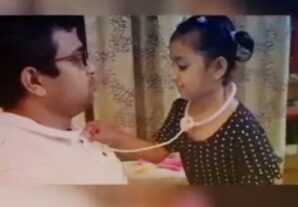 The more exposure the child gets the better will be his/her vocabulary. Young children use different sounds, phrases and words during imaginative paly which can be quite amusing for their parents, caregivers and teachers. For e.g. a child may pretend play like a chef; adding ingredients, naming the items, using culinary terms which he/she may have heard at home or any other environment.
The more exposure the child gets the better will be his/her vocabulary. Young children use different sounds, phrases and words during imaginative paly which can be quite amusing for their parents, caregivers and teachers. For e.g. a child may pretend play like a chef; adding ingredients, naming the items, using culinary terms which he/she may have heard at home or any other environment.
4. Enhance physical development
 Play itself involves movement and use of gross motor and fine motor skills. Often pretend play allows children to be active, which is necessary for their physical development. For e.g. running around the garden as an Olympic athlete or hopping like a kangaroo involves use of larger muscles. Dressing up a doll, plucking flowers from the tree, making sand castles etc. involves use of finer muscles.
Play itself involves movement and use of gross motor and fine motor skills. Often pretend play allows children to be active, which is necessary for their physical development. For e.g. running around the garden as an Olympic athlete or hopping like a kangaroo involves use of larger muscles. Dressing up a doll, plucking flowers from the tree, making sand castles etc. involves use of finer muscles.
5.Support emotional & social development
As children pretend play, they learn to see themselves as individuals and how they fit into the world around them. This “make belief play” teaches them social skills like empathy, cooperation, responsibility and most importantly develops their self-esteem (worth or abilities). For e.g. a role play situation, when children are playing in a group, they need to follow rules, cooperate with each other, take decisions, negotiate rules. Such experiences teach the child to deal with both positive and negative feelings.
Parents and adults need to create a room for opportunity, to help the child pretend play as much as possible. Here are some ideas which parents and adults can implement.
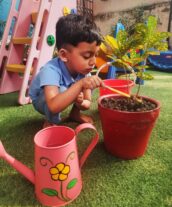
- Keep different size card board boxes
- Give soft toys
- Provide cooking utensils (child size)
- Place gardening tools in the garden (watering can, fork)
- Doll house
- Keep a book shelf
- Keep a tray full of essential items (toothbrush, soap, comb, mirror)
- Doctor Set
- Give some play props (hat, basket, sunglass, magic wand, super hero costume, telescope)
- Go for visits (grocery store, market, zoo)
As children these days are getting involved in more scheduled activities, there is hardly any time left for them to explore their “self”. So, the next time if your child is involved in “pretend play “do not interrupt or engage them in doing any other structured activity as it impacts their power of thinking and reasoning. Let them explore!
– Ipsita Ghosh Dastidar, Student of Montessori Teacher’s Training Course at Bubble Blue.

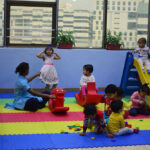




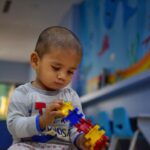
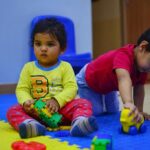
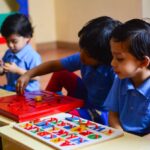

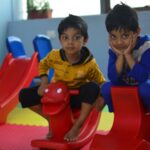
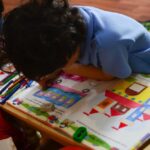
This is a very informative post as it makes parents see their children from a very different perspective. Many a times , parents only give educational toys to children and I believe that a child’s world is full of imagination and pretend play is a way of exploring their own little world of creativity.